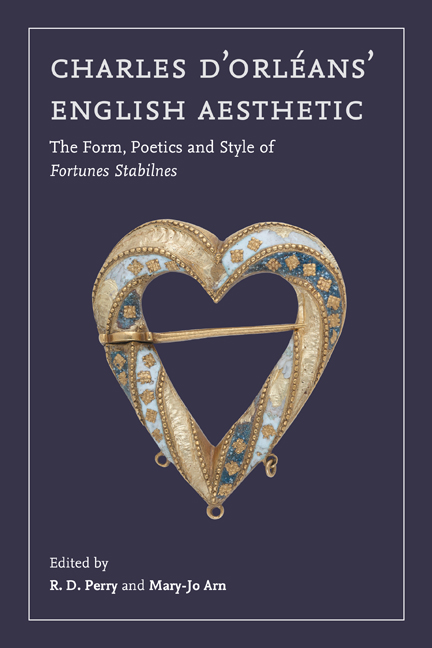Book contents
- Frontmatter
- Dedication
- Contents
- List of Illustrations
- List of Contributors
- Acknowledgements
- Abbreviations
- Introduction
- 1 The Two Dreams of Charles d’Orléans and the Structure of His English Book
- 2 Charles d’Orléans’ Cross-Channel Poetics: The Choice of Ballade Form in Fortunes Stabilnes
- 3 The English Roundel, Charles’s Jubilee, and Mimetic Form
- 4 A Grieving Lover: The Work of Mourning in Charles’s First Ballade Sequence
- 5 Charles d’Orléans’ English Metrical Phonology
- 6 The English Poetry of a Frenchman: Stress and Idiomaticity in Charles d’Orléans
- 7 Verb Use in Charles d’Orléans’ English
- 8 Charles d’Orléans and His Finding of English
- 9 Aureation as Agon: Charles d'Orléans versus John Lydgate
- 10 Charles d’Orléans, Harley 682, and the London Book-Trade
- 11 The Form of the Whole
- Select Publications, 2007–2020
- Index
2 - Charles d’Orléans’ Cross-Channel Poetics: The Choice of Ballade Form in Fortunes Stabilnes
Published online by Cambridge University Press: 14 October 2020
- Frontmatter
- Dedication
- Contents
- List of Illustrations
- List of Contributors
- Acknowledgements
- Abbreviations
- Introduction
- 1 The Two Dreams of Charles d’Orléans and the Structure of His English Book
- 2 Charles d’Orléans’ Cross-Channel Poetics: The Choice of Ballade Form in Fortunes Stabilnes
- 3 The English Roundel, Charles’s Jubilee, and Mimetic Form
- 4 A Grieving Lover: The Work of Mourning in Charles’s First Ballade Sequence
- 5 Charles d’Orléans’ English Metrical Phonology
- 6 The English Poetry of a Frenchman: Stress and Idiomaticity in Charles d’Orléans
- 7 Verb Use in Charles d’Orléans’ English
- 8 Charles d’Orléans and His Finding of English
- 9 Aureation as Agon: Charles d'Orléans versus John Lydgate
- 10 Charles d’Orléans, Harley 682, and the London Book-Trade
- 11 The Form of the Whole
- Select Publications, 2007–2020
- Index
Summary
In René d’Anjou's Livre d’amours du coeur espris (The Book of the Love-Smitten Heart) (1457) the dream vision's protagonist finds himself at a cemetery of famous lovers. At its entrance is a hall hung with the shields and coats of arms of historical and fictional figures such as Julius Caesar, Aeneas, Lancelot, etc., and prominent French aristocracy, such as Jean de Berry (1340–1416), Gaston IV de Foix (1422–1472), and others. The verses painted on the shield of Charles d’Orléans recount the following about the imprisoned poet:
… prins fuz des Anglois et mené en servaige. … I was taken by the English and led into bondage.
Et tant y demouray qu’en aprins le langaige And I spent so long there that I learned the language,
Par lequel fus acoint de dame belle et saige By means of which I grew close to a beautiful and virtuous lady
Et d’elle si espris qu’a Amours fis hommaige, And was so taken with her that I pledged fealty to Love,
Dont mains beaux dits dictié bien prisez davantaige … (lines 1465–1469) About which I composed beautiful dits that were all the more praised …
According to these verses, Charles's acquisition of English in captivity led to an acquaintance with a lady, as a result of which he fell in love and composed highly lauded poetry. Although René does not specify that the poetry itself was composed in English, the causal construction of the clause implies that learning English was the ultimate point of origin for Charles's literary endeavours: had he not learned English, he would not have met the lady, and had he not met the lady, he would not have entered Love's service and composed beautiful poetry. In monumentalising Charles through his bilingualism, René – Charles's contemporary, friend, and a fellow poet himself – seems to posit Charles's English as central not just to the duke's biography, but to his enduring literary legacy.
Despite René's emphasis on Charles's English, the duke remains far more studied for his French, rather than for his English compositions. This is due in no small part to a long-standing conviction, finally put to rest, that Fortunes Stabilnes had to be an inferior anonymous translation of his French poetry.
- Type
- Chapter
- Information
- Charles d’Orléans' English AestheticThe Form, Poetics, and Style of Fortunes Stabilnes, pp. 34 - 81Publisher: Boydell & BrewerPrint publication year: 2020

